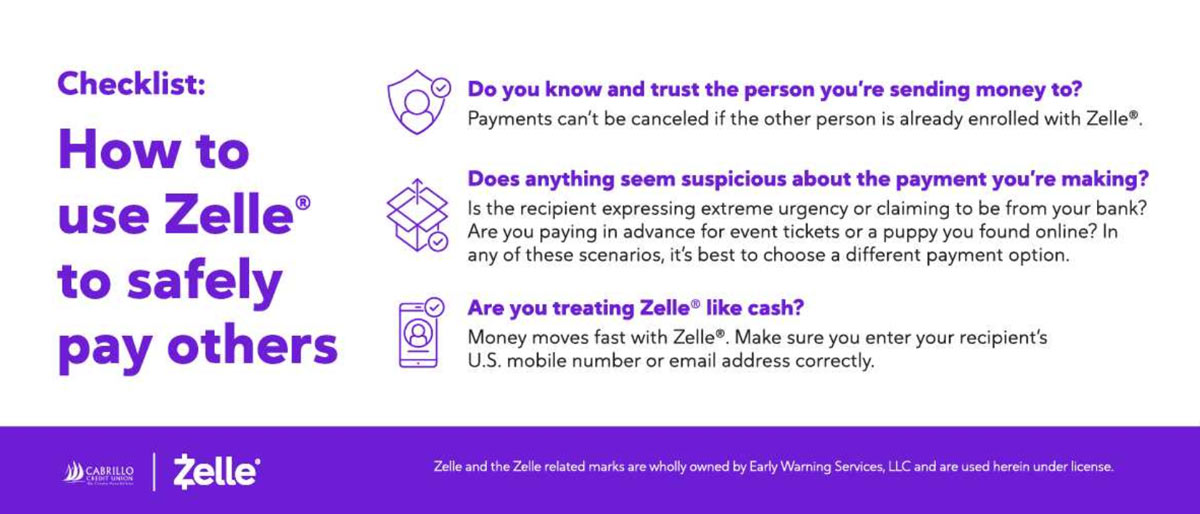Send Money with Zelle® Safely
Zelle® is a great way to send money to friends, family, and others you trust, right from Cabrillo Credit Union. With Zelle®, money moves directly from your account to theirs, typically arriving in minutes.*
We know getting money to friends and family quickly and safely is important, so we've provided some friendly reminders on how to "pay it safe" when you're sending money with Zelle®.
Only send money to those you trust
Zelle® should only be used with friends, family, and others you trust. Why? Because you can’t cancel a payment once it’s been sent if the recipient is already enrolled with Zelle®. And if you send money to someone you don’t know, or you do not get what you expected, you may not get your money back.
Beware of payment scams
If an offer sounds too good to be true, it probably is. For example, a stranger selling concert tickets at a steep discount and insisting you pay with Zelle® might be a scam.
Neither Zelle® nor [Your Bank Name] offers purchase protection for payments made with Zelle® - for example, if you do not receive the item you paid for, or the item is not as described or as you expected.
Confirm your recipient’s contact information
Make sure you have the correct U.S. mobile number or email address for the person you want to send money to. When in doubt, contact your friend to double-check. If you authorize a payment to be sent to the wrong person, you may not get your money back.
Understand your payment options
Treat Zelle® like cash. If you don’t know a person or aren’t sure you’ll get what you paid for, using your credit card may be a better payment option. Check the terms and conditions of your credit card to see what type of purchase protection is offered.
What Are Some Zelle® Scams?
Zelle® scams encompass a range of deceptive practices where fraudsters attempt to exploit individuals or businesses by posing as trusted entities, manipulating them into sending money or disclosing sensitive information. These scams often leverage urgency, phishing tactics, and impersonation to deceive victims, highlighting the importance of vigilance and caution when using Zelle® for financial transactions.

The Zelle® Pay Yourself Scam involves scammers posing as bank representatives who convince individuals to send themselves money through Zelle® to prevent fraudulent transactions, exploiting a sense of urgency to succeed.
Scammers deceive victims by falsely claiming they need a security code to authorize self-payments, leading to unauthorized transfers of funds from victims to scammers' accounts.
To avoid falling victim to this scam, individuals should never share security codes or send money to themselves, and they should verify any suspicious messages or calls with their bank directly.
Zelle® Phishing Scams entail fraudsters sending fraudulent messages via email, text, or phone calls, impersonating trusted entities to extract sensitive information or commit identity theft.
Detecting phishing scams involves looking for inconsistencies in email addresses, unusual greetings, bad grammar, demands for urgent actions, and requests for sensitive information like passwords.
To protect oneself, individuals should avoid clicking on suspicious links, verify the authenticity of messages, and refrain from sharing personal information with unknown sources.
Zelle® Utility Scams target individuals by impersonating power or water company representatives, threatening to cut off services unless immediate payment or personal information is provided.
These scams can involve fake invoices, intentional overpayments followed by refund requests, and unexpected phone calls offering surplus merchandise that is never delivered.
Protecting against utility scams includes verifying invoices, conducting financial audits, establishing payment authorization procedures, and understanding payment options like credit cards.
Small businesses can fall victim to Zelle® Small Business Scams, which include fake invoices, intentional overpayments, and office supply scams that exploit typical business operations.
Detecting these scams involves paying close attention to payment requests, conducting audits, establishing payment authorization procedures, and educating employees.
To safeguard their businesses, small business owners should also understand payment options and avoid rushing into payments when urgency is used as a tactic by scammers.
Cabrillo Credit Union and Zelle®
Your financial well-being is worth the extra effort. Take the time to research and ensure that your account information is shared with trusted and secure entities. This simple precaution can go a long way in protecting your financial security.
We've recently noticed a rise in fraud activity. Please remember that Cabrillo Credit Union will NEVER call and ask for personal information, such as social security numbers, passwords, card numbers, PINS, or other sensitive details.